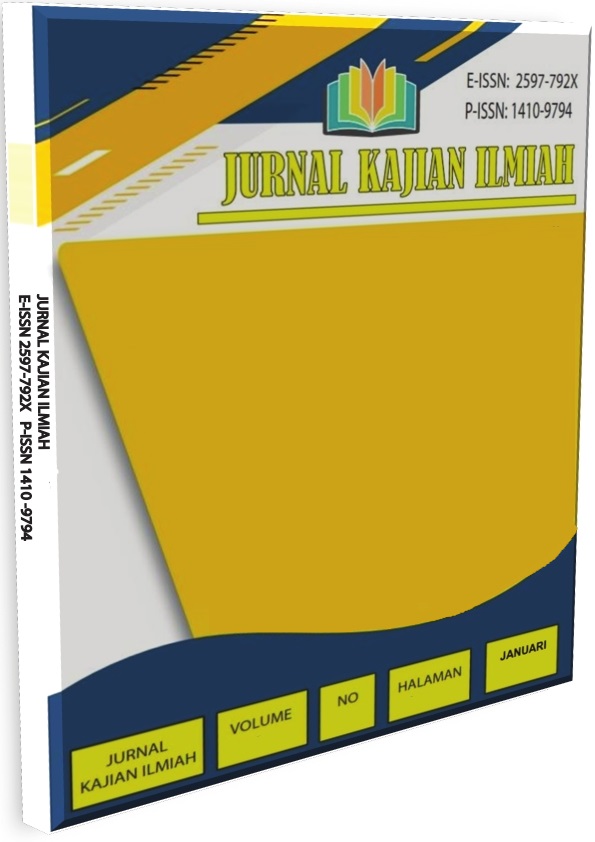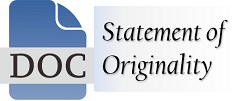Perbedaan Perilaku Kerja Dilihat dari Motivasi dan Stres Kerja Karyawan di Masa Pandemi COVID-19
DOI:
https://doi.org/10.31599/5736cz81Keywords:
COVID-19, Different tests, Motivation, Stress, Work behaviourAbstract
This study aims to analyze differences in work behavior through work motivation and employee work stress during the pandemic and during the COVID-19 pandemic. This study uses a quantitative descriptive design by distributing questionnaires to employees in DKI Jakarta. The number of research samples is 100 people using snowball sampling technique. The problems in the study were tested by different tests with the paired sample t-test, MannWhitney (Wilcoxon), and Kruskall-Wallis. The results of this study are that the COVID-19 pandemic weakens work behaviors related to work stress even though work motivation does not. One of the causes of poor work behavior is because employees work from home. Currently, the main cause of increased work stress is because employees are facing increased unemployment since the spread of COVID-19; or female employees whose workloads are increasingly related to the dual roles of employees and teachers at home since school closures. On the other hand, there is no difference in work motivation before the outbreak of COVID-19, because employees have to earn daily income so they can support their families every day and avoid unemployment. As such, managers must comply with laws concerning employment regulations and disclose important information to employees. Managers need to evaluate layoff issues, evaluate and develop continuity plans according to government regulations to improve work and support employees and their families.
Downloads
References
Aditya, D. N. R., & Ardana, K. (2016). Pengaruh Iklim Organisasi , Kepemimpinan Transformasional, Self Efficacy Terhadap Perilaku Kerja Inovatif. E-Jurnal Manajemen Unud, 5(3), 1801–1830.
Aldi, Y., & Susanti, F. (2019). Pengaruh Stress Kerja Dan Motivasi Kerja Terhadap Prestasi Kerja Karyawan Pada Pt. Frisian Flag Indonesia Wilayah Padang. https://doi.org/10.31227/osf.io/et4rn
Andriyanty, R., Komalasari, F., & Rambe, D. (2021). the Effect of Work From Home on Corporate Culture Mediated By Motivation, Work Behavior, and Performance. Jurnal Aplikasi Manajemen, 19(3), 522–534. https://doi.org/10.21776/ub.jam.2021.019.03.06
Anita, J., Aziz, N., & Yunus, M. (2013). Pengaruh Penempatan Dan Beban Kerja Terhadap Motivasi Kerja Dan Dampaknya Pada Prestasi Kerja Pegawai Dinas Tenaga Kerja Dan Mobilitas Penduduk Aceh. Jurnal Manajemen Pascasarjana Universitas Syiah Kuala, 2(2), 67–77.
Arianto, N., & Kurniawan, H. (2020). Pengaruh Motivasi dan Lingkungan Kerja Terhadap Kinerja Karyawan. JENIUS (Jurnal Ilmiah Manajemen Sumber Daya Manusia), 3(3), 312–321. https://doi.org/10.32493/jjsdm.v3i3.4869
Baker, S. R., Bloom, N., Davis, S. J., & Terry, S. J. (2020). Covid-Induced Economy Uncertanty. In National Bureau of Economic Research Working Paper.
Ding, A. A., Chen, C., & Eisenbarth, T. (2016). Simpler, faster, and more robust t-test based leakage detection. In International workshop on constructive side-channel analysis and secure design (Vol. 9689).
Fong, Y., & Huang, Y. (2019). Modified Wilcoxon–Mann–Whitney Test and Power Against Strong Null. American Statistician, 73(1), 43–49.
Goodell, J. W. (2020). COVID-19 and finance: Agendas for future research. Finance Research Letters.
Gujarati, D. N., & Porter, D. C. (2010). Essentials of Econometrics.
Hadi, S., Putra, A. R., & Rahayu Mardikaningsih. (2020). Pengaruh Perilaku Inovatif dan Keterlibatan Kerja terhadap Kinerja Karyawah. Jurnal Baruna Horizon, 3(1), 156–169.
Husna, D., Sunuharjo, B., & Djudi, M. (2016). Pengaruh Motivasi Kerja Dan Kemampuan Kerja Terhadap Kinerja Karyawan (Studi pada Karyawan PT. PLN (Persero) Distribusi Jawa Timur Area Malang). Jurnal Administrasi Bisnis S1 Universitas Brawijaya, 36(1), 153–162.
ILO. (n.d.). ILO monitor: Covid-19 and the world of work (3 nd ed.). In Geneva: International Labour Organization. (Vol. 2020).
Jeffrey M. Wooldridge. (2009). Introductory Econometrics. Nelson Education, Ltd.
Kim, H., Park, C., & Wang, M. (2018). Paired t₋test based on robustified statistics (Issue November).
Leonando Agsta, & Sutanto, E. M. (2013). Pengaruh Pelatihan Dan Motivasi Kerja Terhadap Kinerja Karyawan Cv Haragon Surabaya. Agora, 1(3), 1.
Lou, Y., Yin Yuen, S., & Chen, G. (2018). Evolving benchmark functions using kruskal-wallis test. In GECCO 2018 Companion - Proceedings of the 2018 Genetic and Evolutionary Computation Conference Companion.
Maulana, T. (2012). Analisa Perilaku Kerja Karyawan Di De Boliva Surabaya Town Square. Jurnal Hospitality Dan Manajemen Jasa, 1, 563–577.
Mayssara A. Abo Hassanin Supervised, A. (2014). Determinants Of Disparities In Covid-19 Job Losses. In National Bureau Of Economic Research.
McKibbin, W. J., & Fernando, R. (2020). The Global Macroeconomic Impacts of COVID-19: Seven Scenarios. SSRN Electronic Journal.
Ngadi, N., Meliana, R., & Purba, Y. A. (2020). Dampak Pandemi Covid-19 Terhadap PHK Dan Pendapatan Pekerja Di Indonesia. Jurnal Kependudukan Indonesia, 2902, 43. https://doi.org/10.14203/jki.v0i0.576
Qiu, Y., Chen, X., & Shi, W. (2020). Impacts of social and economic factors on the transmission of coronavirus disease (COVID-19) in China. In Journal of Population Economics (pp. 1–46).
Rambe, D., & Setyawati, I. (2017). Managing Stress to Improve the Human Resources Performance. International Journal of Scientific & Technology Research, 6(01), 24–28.
Septian Budi Setiawan. (2020). Pengaruh Perubahan Waktu Gilir kerja sebagai Dampak Covid-19 terhadap Kinerja Karyawan (Studi Kasus PT Nusa Halmahera Mineral, Maluku Utara. Jurnal Manajemen Pendidikan Dan Ilmu Sosial, 1(1), 234–243. https://doi.org/10.38035/JMPIS
Setyawati, I., Sufyati, H. S., Kasim, M. Y., Meini, Z., & Hardini, R. (2020). Does the Indonesian Capital Market Have Resistance During the Pandemic of Covid-19? ITALIENISCH, 11(2), 464-469.
Setyawati, I., & Suroso, S. (2016). Sharia Financial Literacy And Effect On Social Economic Factors ( Survey On Lecturer In Indonesia ). International Journal of Scientific & Technology Research, 5(02).
Setyawati, I., Suroso, S., Suryanto, T., & Siti, D. (2017). Does Financial Performance of Islamic Banking is better ? Panel Data Estimation. European Studies Research Journal, XX(2), 592–606.
Stephen P. Robbins, T. A. J. (2013). Perilaku Organisasi: Organizational Behavior. Salemba Empat.
Subandi;, Prasetyo, B. H. ;, & Anubhakti, D. (2020). Aplikasi Penilaian Kinerja Dan Perilaku Kerja Karyawan Universitas Budi Luhur Berbasis Web. Jurnal Bit, 17(2), 46–52.
Usman, A., & Khan, M. K. (2012). Evaluating the Financial Performance of Islamic and Conventional Banks of Pakistan : A Comparative Analysis Abid Usman Sarhad University of Science & Information Technology. International Journal of Business and Social Science, 3(7), 253–257.
Wathon, N., & Yamit, Z. (2005). Pengaruh faktor individu, budaya organisasi dan perilaku kerja terhadap kinerja karyawan di kantor pelayanan pajak yogyakarta dua. 6(6), 111–127.












_-_Copy1.jpg)




